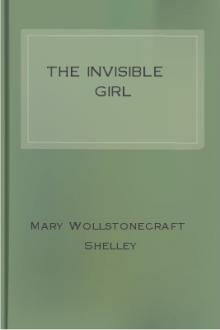The Invisible Girl - Mary Wollstonecraft Shelley (old books to read .txt) 📗

- Author: Mary Wollstonecraft Shelley
- Performer: -
Book online «The Invisible Girl - Mary Wollstonecraft Shelley (old books to read .txt) 📗». Author Mary Wollstonecraft Shelley
it, but no vestige of an inhabitant met his eye, and he began to
persuade himself that the beacon had been a creation of fancy merely.
Arriving at the cottage in question, which was inhabited by a fisherman
and his family, they made an homely breakfast, and then prepared to
return to the tower, to refit their boat, and if possible bring her
round. Vernon accompanied them, together with their host and his son.
Several questions were asked concerning the Invisible Girl and her
light, each agreeing that the apparition was novel, and not one being
able to give even an explanation of how the name had become affixed to
the unknown cause of this singular appearance; though both of the men of
the cottage affirmed that once or twice they had seen a female figure in
the adjacent wood, and that now and then a stranger girl made her
appearance at another cot a mile off, on the other side of the
promontory, and bought bread; they suspected both these to be the same,
but could not tell. The inhabitants of the cot, indeed, appeared too
stupid even to feel curiosity, and had never made any attempt at
discovery. The whole day was spent by the sailors in repairing the boat;
and the sound of hammers, and the voices of the men at work, resounded
along the coast, mingled with the dashing of the waves. This was no time
to explore the ruin for one who whether human or supernatural so
evidently withdrew herself from intercourse with every living being.
Vernon, however, went over the tower, and searched every nook in vain;
the dingy bare walls bore no token of serving as a shelter; and even a
little recess in the wall of the staircase, which he had not before
observed, was equally empty and desolate.
Quitting the tower, he wandered in the pine wood that surrounded it, and
giving up all thought of solving the mystery, was soon engrossed by
thoughts that touched his heart more nearly, when suddenly there
appeared on the ground at his feet the vision of a slipper. Since
Cinderella so tiny a slipper had never been seen; as plain as shoe could
speak, it told a tale of elegance, loveliness, and youth. Vernon picked
it up; he had often admired Rosina’s singularly small foot, and his
first thought was a question whether this little slipper would have
fitted it. It was very strange!—it must belong to the Invisible Girl.
Then there was a fairy form that kindled that light, a form of such
material substance, that its foot needed to be shod; and yet how
shod?—with kid so fine, and of shape so exquisite, that it exactly
resembled such as Rosina wore! Again the recurrence of the image of the
beloved dead came forcibly across him; and a thousand home-felt
associations, childish yet sweet, and lover-like though trifling, so
filled Vernon’s heart, that he threw himself his length on the ground,
and wept more bitterly than ever the miserable fate of the sweet orphan.
In the evening the men quitted their work, and Vernon returned with them
to the cot where they were to sleep, intending to pursue their voyage,
weather permitting, the following morning.
Vernon said nothing of his slipper, but returned with his rough
associates. Often he looked back; but the tower rose darkly over the dim
waves, and no light appeared. Preparations had been made in the cot for
their accommodation, and the only bed in it was offered Vernon; but he
refused to deprive his hostess, and spreading his cloak on a heap of dry
leaves, endeavoured to give himself up to repose. He slept for some
hours; and when he awoke, all was still, save that the hard breathing of
the sleepers in the same room with him interrupted the silence. He rose,
and going to the window,—looked out over the now placid sea towards the
mystic tower; the light burning there, sending its slender rays across
the waves. Congratulating himself on a circumstance he had not
anticipated, Vernon softly left the cottage, and, wrapping his cloak
round him, walked with a swift pace round the bay towards the tower. He
reached it; still the light was burning. To enter and restore the maiden
her shoe, would be but an act of courtesy; and Vernon intended to do
this with such caution, as to come unaware, before its wearer could,
with her accustomed arts, withdraw herself from his eyes; but,
unluckily, while yet making his way up the narrow pathway, his foot
dislodged a loose fragment, that fell with crash and sound down the
precipice. He sprung forward, on this, to retrieve by speed the
advantage he had lost by this unlucky accident. He reached the door; he
entered: all was silent, but also all was dark. He paused in the room
below; he felt sure that a slight sound met his ear. He ascended the
steps, and entered the upper chamber; but blank obscurity met his
penetrating gaze, the starless night admitted not even a twilight
glimmer through the only aperture. He closed his eyes, to try, on
opening them again, to be able to catch some faint, wandering ray on the
visual nerve; but it was in vain. He groped round the room: he stood
still, and held his breath; and then, listening intently, he felt sure
that another occupied the chamber with him, and that its atmosphere was
slightly agitated by another’s respiration. He remembered the recess in
the staircase; but, before he approached it, he spoke:—he hesitated a
moment what to say. “I must believe,” he said, “that misfortune alone
can cause your seclusion; and if the assistance of a man—of a
gentleman—”
An exclamation interrupted him; a voice from the grave spoke his
name—the accents of Rosina syllabled, “Henry!—is it indeed Henry whom
I hear?”
He rushed forward, directed by the sound, and clasped in his arms the
living form of his own lamented girl—his own Invisible Girl he called
her; for even yet, as he felt her heart beat near his, and as he
entwined her waist with his arm, supporting her as she almost sank to
the ground with agitation, he could not see her; and, as her sobs
prevented her speech, no sense, but the instinctive one that filled his
heart with tumultuous gladness, told him that the slender, wasted form
he pressed so fondly was the living shadow of the Hebe beauty he had
adored.
The morning saw this pair thus strangely restored to each other on the
tranquil sea, sailing with a fair wind for L—, whence they were to
proceed to Sir Peter’s seat, which, three months before, Rosina had
quitted in such agony and terror. The morning light dispelled the
shadows that had veiled her, and disclosed the fair person of the
Invisible Girl. Altered indeed she was by suffering and woe, but still
the same sweet smile played on her lips, and the tender light of her
soft blue eyes were all her own. Vernon drew out the slipper, and showed
the cause that had occasioned him to resolve to discover the guardian of
the mystic beacon; even now he dared not inquire how she had existed in
that desolate spot, or wherefore she had so sedulously avoided
observation, when the right thing to have been done was, to have sought
him immediately, under whose care, protected by whose love, no danger
need be feared. But Rosina shrunk from him as he spoke, and a death-like
pallor came over her cheek, as she faintly whispered, “Your father’s
curse—your father’s dreadful threats!” It appeared, indeed, that Sir
Peter’s violence, and the cruelty of Mrs. Bainbridge, had succeeded in
impressing Rosina with wild and unvanquishable terror. She had fled from
their house without plan or forethought—driven by frantic horror and
overwhelming fear, she had left it with scarcely any money, and there
seemed to her no possibility of either returning or proceeding onward.
She had no friend except Henry in the wide world; whither could she
go?—to have sought Henry would have sealed their fates to misery; for,
with an oath, Sir Peter had declared he would rather see them both in
their coffins than married. After wandering about, hiding by day, and
only venturing forth at night, she had come to this deserted tower,
which seemed a place of refuge. I low she had lived since then she could
hardly tell;—she had lingered in the woods by day, or slept in the
vault of the tower, an asylum none were acquainted with or had
discovered: by night she burned the pine-cones of the wood, and night
was her dearest time; for it seemed to her as if security came with
darkness. She was unaware that Sir Peter had left that part of the
country, and was terrified lest her hiding-place should be revealed to
him. Her only hope was that Henry would return—that Henry would never
rest till he had found her. She confessed that the long interval and the
approach of winter had visited her with dismay; she feared that, as her
strength was failing, and her form wasting to a skeleton, that she might
die, and never see her own Henry more.
An illness, indeed, in spite of all his care, followed her restoration
to security and the comforts of civilized life; many months went by
before the bloom revisiting her cheeks, and her limbs regaining their
roundness, she resembled once more the picture drawn of her in her days
of bliss, before any visitation of sorrow. It was a copy of this
portrait that decorated the tower, the scene of her suffering, in which
I had found shelter. Sir Peter, overjoyed to be relieved from the pangs
of remorse, and delighted again to see his orphan-ward, whom he really
loved, was now as eager as before he had been averse to bless her union
with his son: Mrs. Bainbridge they never saw again. But each year they
spent a few months in their Welch mansion, the scene of their early
wedded happiness, and the spot where again poor Rosina had awoke to life
and joy after her cruel persecutions. Henry’s fond care had fitted up
the tower, and decorated it as I saw; and often did he come over, with
his “Invisible Girl,” to renew, in the very scene of its occurrence, the
remembrance of all the incidents which had led to their meeting again,
during the shades of night, in that sequestered ruin.
THE END




Comments (0)